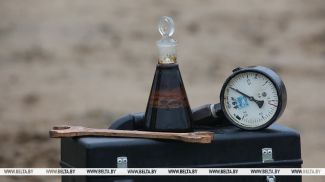
MINSK, 11 September (BelTA) - The first company from Tajikistan has successfully passed the accreditation procedure at the Belarusian Universal Commodity Exchange (BUCE) as a non-resident exchange broker, BelTA learned from the BUCE press service.
Now the BUCE’s network of foreign brokers includes 19 companies from ten countries: China, Egypt, Kazakhstan, Latvia, Mongolia, Poland, Russia, Singapore, Tajikistan and Uzbekistan.
The main task of the new broker will be to attract Tajik importers of timber and agricultural products to the exchange and assist them in making exchange transactions. In addition, the Tajik broker plans to advise its clients, if necessary, on settlement, logistics, and quality control of goods purchased on the exchange, as well as to promote Belarusian products and exchange services on the market of Tajikistan.
The exchange trade between Belarus and Central Asian countries is vibrant. In January-August 2024, the total amount of transactions of traders from Kazakhstan, Kyrgyzstan, Tajikistan, Turkmenistan and Uzbekistan made up $56 million. This is almost 4 times more than in the same period last year. The growth of exchange trade is observed across all the countries of the region.
The volume of transactions with Tajikistan increased six times in value terms. Tajik companies mainly bought Belarusian softwood timber and exported cotton yarn to Belarus. In September, the first exchange contracts were concluded for the supply of Belarusian milk powder and whey to Tajikistan. “We expect that with the assistance of the Tajik broker, sales of domestic dairy products to this promising market will grow significantly,” the BUCE press service said.
The public joint-stock company (OAO) Belarusian Universal Commodity Exchange was established in 2004. The first trade sessions took place in June 2005. BUCE is one of the largest commodity exchanges in Eastern Europe. Its key function is to assist Belarusian companies with exporting their products and assist foreign companies with entering the Belarusian market. The commodity exchange facilitates trade in metals, timber, agricultural products, and a broad choice of industrial and consumer goods.
Now the BUCE’s network of foreign brokers includes 19 companies from ten countries: China, Egypt, Kazakhstan, Latvia, Mongolia, Poland, Russia, Singapore, Tajikistan and Uzbekistan.
The main task of the new broker will be to attract Tajik importers of timber and agricultural products to the exchange and assist them in making exchange transactions. In addition, the Tajik broker plans to advise its clients, if necessary, on settlement, logistics, and quality control of goods purchased on the exchange, as well as to promote Belarusian products and exchange services on the market of Tajikistan.
The exchange trade between Belarus and Central Asian countries is vibrant. In January-August 2024, the total amount of transactions of traders from Kazakhstan, Kyrgyzstan, Tajikistan, Turkmenistan and Uzbekistan made up $56 million. This is almost 4 times more than in the same period last year. The growth of exchange trade is observed across all the countries of the region.
The volume of transactions with Tajikistan increased six times in value terms. Tajik companies mainly bought Belarusian softwood timber and exported cotton yarn to Belarus. In September, the first exchange contracts were concluded for the supply of Belarusian milk powder and whey to Tajikistan. “We expect that with the assistance of the Tajik broker, sales of domestic dairy products to this promising market will grow significantly,” the BUCE press service said.
The public joint-stock company (OAO) Belarusian Universal Commodity Exchange was established in 2004. The first trade sessions took place in June 2005. BUCE is one of the largest commodity exchanges in Eastern Europe. Its key function is to assist Belarusian companies with exporting their products and assist foreign companies with entering the Belarusian market. The commodity exchange facilitates trade in metals, timber, agricultural products, and a broad choice of industrial and consumer goods.













